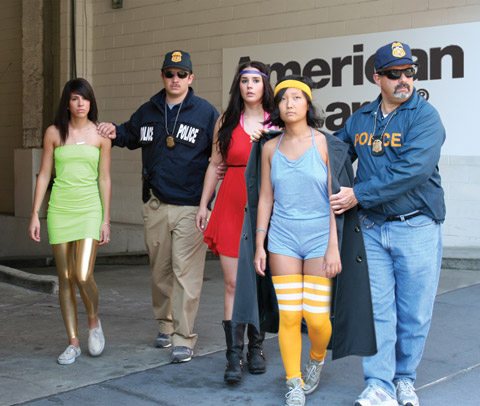Give Shoplifting From American Apparel a whirl: all 100 pages of relentlessly banal reportage following a fey 20-something gallows bird called Sam and his schoolboy attempts at half-inching stuff from American high street stores. Soak up the boredom, and the blankness. Revel in Lin’s clinically vacant, "minimal" style, lifted straight from Hemingway, Bret Easton Ellis, Dennis Cooper, Joan Didion, Ezra Pound and Albert Camus. Hoodwink yourself into believing that Lin is writing with the controlled force of an aged Samuel Beckett as the ex-Dubliner sat down in exile to craft the exquisite, concise and bilious NoHow On trilogy, if you like. I wouldn’t bother, though. There’s no trace here of the anger, frustration and betrayal that fuelled the Irish slow left-arm bowler’s twilight years; just an antagonistic sense of self-pitying indifference.
Less Ill Seen Ill Said, then, and more Sartre’s Nausea pushed to shattering point and rendered naked in a tyranny of monotonously clipped sentences, each of which appear to be prefixed with the declaratives: "[He] said" and "[They] thought". Like Nausea, nothing much happens. For a large part, all Sam (Lin’s semi-autobiographical protagonist and fellow erstwhile e-writer) does is discusses his life and ambitions for Amazon.com success with other cardboard characters via text messages and online instant messaging services. Elsewhere he gets nicked, twice, for stealing from shops with seemingly no real intent and gets let off both times with community service. He works in a vegan café but lives off cereal. He flirts with women by asking them to give him jumping hi-fives, and then bottles out of sex. He has the emotional capacity and charm of a slug. It ends with Sam telling one of his flunky admirers that he always dreamed of being a marine biologist. Fin.
This however, isn’t existential crisis; the absence of narrative shouldn’t be mistaken for an allegorical anti-narrative, either. Everything that exists in Shoplifting . . . is so neutered, so self-involved, so purposeless, that it couldn’t possibly be against anything.
And that is the point. Because if there’s one good thing about this novel, it is that it depicts the total boredom of Lin’s subject (‘modern life’, née ‘the human condition’) without remiss. If Henry Miller’s Tropic of Cancer was a gob in face of god, Shoplifting . . . is a long slow piss in the face of all and sundry, written by a member of a generation that grew up to discover that not only had their parents eschewed divinity, but fear, joy, pain, happiness, hatred and forgiveness too. And as an example of this contemporary nightmare, it’s faultless, from the substance of its one, soulless idea to the mundane style of its articulation too.
But it doesn’t question anything either, and that’s its real failure. Ultimately all this is, is a critique without end or goal; an infinite insult aimed at the entire universe that affirms nothing but would happily send everything to hellfire. In some respects, to have achieved that with such brevity is something to be marvelled at. In others, it’s merely a truly terrifying statement.
Indeed, some 25 years ago, critics accused Bret Easton Ellis of being guilty of this, in his debut novel Less Than Zero. A similar work in tone, it followed another vacant, semi-autobiographical, young American male, bereft of purpose and emotion and surrounded by the opulence of upper-middle class suburban LA. Ellis effectively asked the reader, "What can you want, when you want for nothing?" and then took them by the wrist and showed them the end sum — teenage prostitution, prepubescent drug addiction, emotional and physical abuse, rape, torture, murder; the entire grim, Sadeian shebang. But Ellis’s unflinching portrayal didn’t glorify or posture glibly; it condemned what he saw as the dark, hollow centre of 1980s American culture.
Shoplifting . . . doesn’t even attempt such critique. Real art doesn’t hinge upon opaque observations and bland reproductions of the world. That’s just boundless, patronising cynicism, which invests the artist — like the priest or the monarch — with some clandestine wisdom mere lay folk can only ever hope to experience through the frail edifice of the artist’s world, but can never truly understand since everything is reduced to little more than residual, obsolete components anyway. Real art seeks to examine the truth as it is; not through relativism, atomism, or universalism, but by seeking that which once was, irrevocably, true. Lest we forget: Shakespeare’s Hamlet might have been a mixed up young lad, but — for better or for worse, and whether by design or volition — he did for his stepdad in the end, didn’t he?
Shoplifting From American Apparel is published by the sincerely brilliant folk at Melville House Publishing, and is available now.


